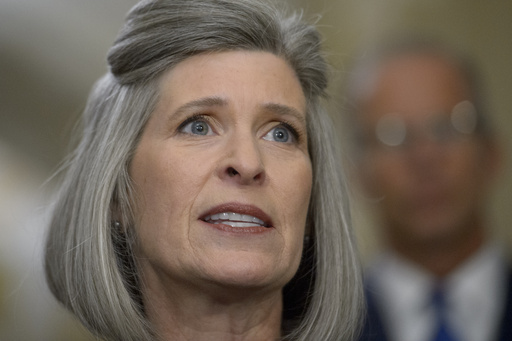In Washington, a notable voice has emerged in the discourse surrounding military sexual misconduct claims—the story of Senator Joni Ernst, a combat veteran from the Iraq War and a survivor of sexual assault. For years, she has pushed for reforms to better address such issues within the military. However, her initial hesitance towards the nomination of President-elect Donald Trump’s choice for defense secretary, Pete Hegseth, who has controversial views on women in combat and allegations against him, has placed her in a precarious position within the Republican party. Critics from her own party have publicly voiced disappointment and issued threats about a potential primary challenge in the 2026 elections.
Bob Vander Plaats, a prominent conservative figure in Iowa, articulated the pressure Ernst faces, highlighting that there is an expectation for elected officials to align with the party’s dominant sentiments. The tension surrounding Ernst, once considered a promising leader in the GOP, signals a lack of tolerance for dissent in Trump’s faction of the party, especially regarding any acknowledgment of opposition to nominees such as Hegseth, who embodies the controversial wing of Trump’s selections.
This situation not only reflects Ernst’s current struggles but also serves as a warning to other senators considering their stance on Trump’s appointments, including other contentious nominees like Robert F. Kennedy Jr. and Tulsi Gabbard.
Iowa talk radio host Steve Deace suggested on air that should Trump desire a new Republican senator from Iowa, he would support that change. He indicated a willingness to challenge Ernst if that aligns with Trump’s interests, emphasizing the resilience needed for GOP members in the current political landscape.
Supporters of Ernst maintain that her experience and background as a combat veteran allows her to withstand the mounting criticism. David Kochel, a Republican strategist and long-time associate of Ernst, noted that despite online pressures, her military experience equips her with a strong sense of resolve and determination to make decisions based on her evaluations of individuals like Hegseth.
Ernst has been working to mend her relationship with Trump following her earlier reluctance to endorse him before the Iowa caucuses. Recently, she showcased her engagement with Trump at his Florida residence, Mar-a-Lago, where discussions included strategies to improve governmental efficiency. She currently leads a newly formed group in the Senate, indicating her attempts to maintain relevance within the party amidst Trump’s leadership.
Interestingly, Trump himself has refrained from directly pressuring Ernst to support Hegseth or any of his selections publicly. This absence of direct intervention may suggest that he feels secure in the support he has within the party, yet the response to Ernst’s initial hesitance was swift and intense, reflecting the prevailing sentiment of Trump’s base.
Polling data indicates a lukewarm reception for Hegseth’s nomination amongst the public, with only about 20% approval from Americans and slightly more than one-third of Republicans viewing him favorably. Concerns within Trump’s camp about the implications of a failed nomination for Hegseth include the potential to embolden dissent against other nominees, threatening his dominance within the party.
The backlash against Ernst included sharp criticisms from key figures within the Republican establishment, including Donald Trump Jr. and conservative commentator Charlie Kirk, both echoing threats regarding her political future and suggesting the existence of challengers prepared to contest her position.
Adding to the pressure, Building America’s Future, a conservative organization, announced a significant financial commitment to support Hegseth’s nomination, launching campaigns that portray Ernst unfavorably. Criticism has not been limited to national figures; local Republican leaders have also urged constituents to reach out to Ernst’s office, reinforcing calls for her to support Trump’s agenda.
In a changing political environment where incumbents may have a powerful foothold, Trump is noted for his ability to end the political careers of those who oppose him. Jason Miller, a senior adviser to Trump, emphasized that the current political landscape heavily favors Trump’s influence, and voters are inclined to want his choice in key positions within the government.
Despite the challenges, Ernst appears to be recalibrating her stance towards Hegseth. Following further discussions with him, she expressed optimism about their conversations, highlighting commitments he has made regarding military accountability and prioritizing issues related to sexual assault prevention. Her public statements reflect a shift as she pledges to support Hegseth while seeking a fair process regarding his confirmation.
Yet for many in the GOP, Ernst’s situation serves as a stark reminder of the risks associated with diverging from Trump’s preferred choices. Senator Lisa Murkowski recounted a notable increase in the attacks against her and acknowledged that while her decision-making remains unaffected, Ernst’s considerations may be more influenced by the current political climate.
